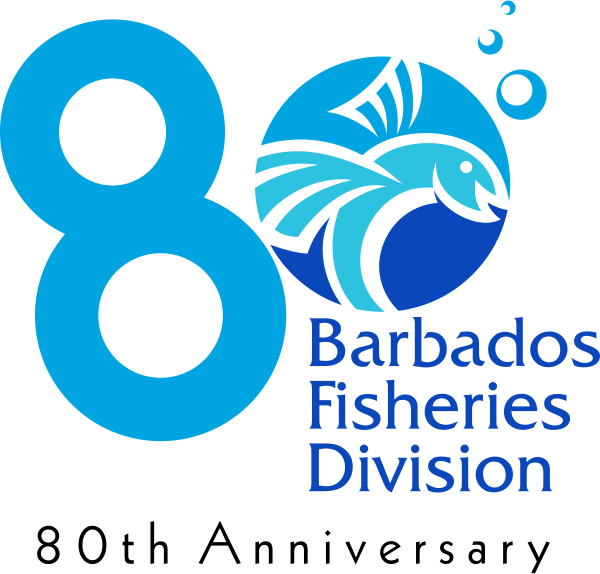Today we celebrate 80 years of exceptional service to the Barbados Fishing Industry. On 1st April 1944 the Barbados Fisheries Division would be tasked with overseeing the development and management of local fisheries, the Division was established within the Department of Agriculture and Science, with the appointment of a plant diseases inspector in the Department of Agriculture and sports fisherman as the island's first Fisheries Officer.
How do we chart the way forward toward a bluer future for the fisheries sector? The answer lies in the word FISHERIES itself, each letter can be used to highlight interventions that should be promoted as key policy measures for sustainable development.
F- Family
Blue-blood is thicker than salt water
Fishing skills, traditional knowledge, culture, values, customs, practices and artifacts are passed down from generation from generation supporting a rich coastal heritage in the Caribbean. Preserving our coastal heritage by promoting the importance of traditional knowledge and unlocking its potential to address significant challenges including the climate crisis should be a priority going forward. The importance of local knowledge of fisherfolk regarding changes not normally observed or examined through science should not be overlooked by fisheries managers and policy makers, especially in the data poor environment typical of the fisheries sector in the Caribbean.
I- Innovation
Catching the digital wave of change
Innovation in fisheries, especially efforts to use digital technologies to solve issues and promote sustainable fishing practices, has arguably been slower than comparative efforts in other industries. Digital literacy of Caribbean fisherfolk still remains an issue and is a major barrier to the successful use of digital technologies. However, the tide is changing and there are novel initiatives such as the use of state-of-the-art ICTs, vessel monitoring systems, online market places, mobile apps and fisheries information management systems that should be scaled up to revolutionise our sector.
S- Scientific information
Evidence-based decision making
The management of fisheries should be grounded in the best available research and informed by experiential evidence from the field and relevant contextual evidence. Scientific information is key in informing fisheries management measures such as determining close seasons, size limits for certain fish species, gear restrictions and quotas. Data driven solutions using real time vessel location data are delivering actionable insights of fishing activity which can support monitoring, control and surveillance. Integrating scientific information and traditional knowledge can inform meaningful adaptation to climate change and support efforts to manage climate risks in the fisheries sector.
H-Habitat restoration
Nature-based solutions for climate resilience
Restoration of our coastal ecosystems that have been degraded over time due to human activities and impacts of climate change should be our utmost priority. Fisherfolk are on the frontline in the battle against climate change. Witnessing first hand real environmental and social changes that result in a decline in catches and incomes. Nature-based solutions such as restoration of mangroves, sea grass beds and coral reefs can address societal challenges, build resilience to climate change and provide benefits for both human well-being and biodiversity.
E- Ecosystem stewardship
Responsible use and protection
As ecosystem stewards, stakeholders in the fisheries sector have traditionally promoted the responsible use and protection of the natural environment. Small-scale fishers often act in ways that deliberately or inadvertently function as conservation measures. Traditional practices like selective harvesting, self-imposed closed seasons and closed areas and even the observation of customary fishing rights are good examples of informal conservation measures. Management and conservation measures that are compatible with customs and cultural norms are more liable to achieve acceptance than cookie-cutter approaches to fisheries management.
R- Renewable energy systems
Harnessing the power of the ocean
Combatting climate change through the application of energy efficient systems throughout the fisheries value chain is a key step in building resilience. Solar energy systems are being used in some countries to reduce energy costs at fish markets. Large fish processors are also using solar energy systems to power their operations. There has been a successful uptake of solar powered battery chargers in some countries in the region and a keen interest in the introduction of electric powered outboard engines and hybrid inboard engines, demonstrating that fisherfolk are willing to reduce input costs and improve their operations. Looking towards the future, renewable ocean energy systems may offer solutions for reducing the industry’s heavy dependence on fossil fuels.
I- Inter-sectoral collaboration
Working together to solve ‘wicked problems’
The complexity and ‘wicked problems’ associated with the fisheries industry warrants the need for people-centred approaches to management and governance that includes representation from other sectors such as tourism, health, energy and agriculture. Collective action using a multi-sectoral approach may offer solutions to address diverse societal challenges. Promoting the equitable participation of women and youth in decision-making processes may offer novel ways to address existing and potential barriers. Capacity development is also key in making sure that all stakeholders have the knowledge needed to cope and adapt to emerging issues.
E- Eco-friendly practices
Going green
In addition to renewable energy systems, adopting eco-friendly practices along the value chain can promote efficiency and reduce input costs. Initiatives such as water conservation measures including rainwater harvesting, solid waste management and pollution control and management at fish landing sites, markets and other fisheries related businesses should be encouraged. Utilising fish waste to make value-added products including biofuel can promote a circular economy in the fisheries sector. Other initiatives such as sustainability branding such as MSC certification and Eco-labelling can also be explored.
S-Social security measures
Providing a safety net
Social security and healthcare protection in small-scale fisheries along the entire value chain needs to be promoted as a matter of urgency especially in light of the COVID-19 pandemic. Supporting the development of and access to services including savings, credit, pension and insurance schemes should be a priority action. Innovative insurance schemes in the region such as the climate risk parametric insurance scheme COAST provides payouts to fisherfolk to help them to recover quickly after weather-related events.
This course of action may be met with many turbulent seas but with passionate leaders at the helm to steer us in the right direction, we will sail safely to our destination.
Cover Photo Credit: David Lewis (Caribbean Aerial Photography)


